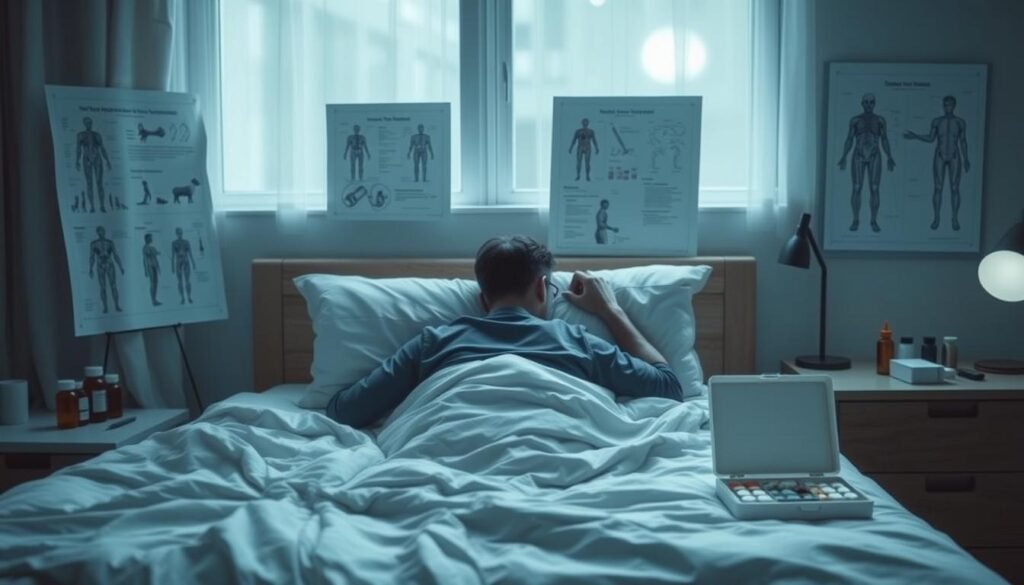Did you know about 30% of adults struggle with insomnia at times? Secondary insomnia is special because it’s linked to other health problems or medicines, not just stress or your bedroom’s light. This makes knowing if your insomnia is primary or secondary very important for fixing it.
Different from primary insomnia, secondary insomnia hints at bigger health issues or side effects from meds. Let’s dive into this common sleep disorder and understand it better.
Key Takeaways
- Secondary insomnia is linked to medical conditions or medications.
- About 30% of adults experience symptoms of insomnia.
- The distinction between primary and secondary insomnia is vital for effective treatment.
- Common causes of secondary insomnia include mental health issues and chronic pain.
- Maintaining good sleep hygiene can help in managing insomnia symptoms.
Understanding Secondary Insomnia
Many people find insomnia a big problem. It often comes from different causes. Definition of secondary insomnia means sleep problems because of other health issues, mental conditions, or some medicines. There are different kinds like trouble falling asleep, staying asleep, or feeling unrefreshed. Each kind changes how well a person sleeps.
Definition of Secondary Insomnia
Secondary insomnia happens due to external reasons. About 30% of those with long-term insomnia have a health problem causing it. Around 25% of these cases are linked to issues like arthritis or asthma. Mental health problems like depression make up 30% of cases, showing insomnia’s personal impact.
Differentiating Between Primary and Secondary Insomnia
Unlike primary insomnia, which is not caused by other health issues, secondary insomnia has many causes. For example, some medicines can cause it. Chronic insomnia, lasting more than a month, mainly comes from these external issues. It majorly disrupts daily activities.
It’s vital to know the distinguishing types of insomnia for proper diagnosis and treatment. This helps doctors focus on the sleep troubles and underlying causes. For more info on insomnia, check out these resources for a detailed look at this complex disorder.
Common Medical Conditions Leading to Secondary Insomnia
Learning about medical problems that cause secondary insomnia helps us see how health affects sleep. Many things can interrupt sleep. This includes mental health issues, ongoing pain, and hormone changes. These problems can mess up how we normally sleep, making good rest hard to get.
Mental Health Conditions
Mental health deeply influences our sleep quality. Anxiety and depression are common and can ruin a good night’s sleep. They make us overthink or feel too much, stopping us from relaxing. This bad cycle can keep going, hurting our mental health even more.
Chronic Pain and Its Impact on Sleep
Long-term pain is a big reason why some can’t sleep well. Diseases like arthritis and fibromyalgia are painful and mess with our sleep. If you’re in pain, you might wake up a lot at night. This decreases how much you sleep and affects your health.
Hormonal Imbalances and Sleep Disruption
Hormonal issues can also mess up our sleep. For example, hyperthyroidism can make our metabolism too fast and increase anxiety. For women, changes in hormones during menopause can lead to hot flashes and sleepless nights. It’s important to fix these hormone problems to sleep better.
| Condition | Impact on Sleep | Potential Solutions |
|---|---|---|
| Mental Health (Anxiety, Depression) | Disrupted sleep patterns; difficulty falling asleep | Cognitive Behavioral Therapy, medication |
| Chronic Pain (Arthritis, Fibromyalgia) | Frequent awakenings; discomfort when lying down | Pain management therapies, physical therapy |
| Hormonal Imbalances (Menopause, Hyperthyroidism) | Night sweats; increased anxiety | Hormone therapy, lifestyle adjustments |
Medications Known to Cause Secondary Insomnia
Many medicines can lead to secondary insomnia, affecting lots of people who just want a good night’s sleep. Knowing how these drugs work can help patients choose their treatments wisely, especially if their insomnia is due to another health issue.
Types of Prescription Medications
There are many prescription drugs that might keep you awake as a side effect. Here are a few types:
- Pain Medications: Drugs like fentanyl and hydrocodone can mess up how you sleep. This can make conditions like sleep apnea worse.
- Stimulants: Drugs meant to keep you alert like amphetamine-dextroamphetamine and methylphenidate can also make it harder to fall asleep.
- Steroids: Something like prednisone can make you restless and lower your melatonin, which may cause trouble sleeping, especially in large doses.
- Antidepressants: Even though they’re meant to help with depression, some antidepressants can still affect your sleep negatively.
Effects of Over-the-Counter Drugs
Medicines you can buy without a prescription can also lead to secondary insomnia. Some ingredients in these drugs can mess with your sleep if you’re not careful.
- Antihistamines: Found in many allergy meds, they can make you sleepy but might also interrupt your sleep.
- Alcohol: Even though some people use it to try to sleep better, alcohol can lead to addiction and make sleep problems worse. About 22% of people with chronic insomnia say they’ve used it as a sleep aid.
For adults struggling with anxiety and sleep problems, taking a look at these options might help.

| Medication Type | Examples | Effects on Sleep |
|---|---|---|
| Pain Medications | Fentanyl, Hydrocodone, Oxycodone | Altered sleep cycles, sleep apnea |
| Stimulants | Amphetamines, Methylphenidate | Increased sleep onset latency, insomnia |
| Steroids | Prednisone, Dexamethasone | Restlessness, decreased melatonin |
| Over-the-Counter Drugs | Antihistamines, Ethanol | Possible daytime drowsiness, dependency |
How Secondary Insomnia Affects Overall Health
Secondary insomnia can greatly upset your mental and physical health. This leads to many bad outcomes. Beyond just feeling tired, it deeply affects a person’s mental state and life quality.
Impact on Mental and Emotional Well-being
Those with secondary insomnia are more likely to face anxiety and mood swings. They may feel more irritable and sad. This makes it tough to handle their emotions.
Sleep loss can also weaken brain functions. Problems with focusing and remembering things may arise.
Physical Health Consequences
Not getting enough sleep triggers various health issues. People with secondary insomnia may see their immune system and energy drop. This can result in serious health problems such as high blood pressure, diabetes, and obesity.
Poor sleep and physical health are linked. Bad sleep makes existing health troubles worse, harming a person’s overall health even more.

Diagnosing Secondary Insomnia
Doctors start by looking closely at a person’s medical history and sleep patterns to diagnose secondary insomnia. They focus on finding what might be causing the sleep problems. This includes talking about sleep habits, lifestyle, and any health issues that might affect sleep.
Evaluating Medical History and Sleep Patterns
At the first appointment, patients are often asked to keep a sleep diary. This diary tracks when they sleep and how well they sleep. By looking at this diary, doctors can spot patterns that help diagnose insomnia. They consider things like stress, recent life changes, or health problems that could be causing sleep issues. Knowing these factors helps in making a good treatment plan.
Utilization of Sleep Studies
Sometimes, doctors suggest sleep studies to learn more about the sleep problems. Sleep studies are done in special labs. They record brain activity, eye movements, and heart rate while sleeping. This helps to identify or dismiss conditions like sleep apnea or restless legs syndrome. Patients might also use Actigraphy. This involves wearing sensors to track sleep and wakefulness over several days.

Collecting this information is key in understanding what’s wrong and deciding on treatment. If you’re having trouble sleeping, getting a complete medical check-up is crucial. It can help find the causes of sleep issues and how to treat them for better sleep.
Learn more about diagnosing secondaryinsomnia
Treatment Options for Secondary Insomnia
Treatment for secondary insomnia aims to fix the root problems affecting sleep. This is key to improving sleep quality. It involves handling the causes of insomnia.
Addressing Underlying Medical Conditions
Chronic insomnia may point to other health issues. These often need a detailed check-up. Treatment includes:
- Thorough physical examinations
- Adaptation of lifestyle habits
- Pursuit of medical treatments or psychotherapy
Drugs can help many patients. Drugs like triazolam and lorazepam are popular. Yet, their risk of addiction worries doctors. Options like zolpidem and eszopiclone are safer but need caution, especially with alcohol.
Cognitive Behavioral Therapy (CBT) for Insomnia
CBT is now a top method for treating secondary insomnia. It focuses on changing thoughts and actions that block sleep. Studies show CBT can improve sleep better than meds.
Adding lifestyle changes to CBT boosts sleep quality. This includes exercising, keeping good sleep habits, and practicing mindfulness. A skilled therapist can create a custom CBT plan for each person.
If you’re dealing with secondary insomnia, it’s vital to understand your options. For in-depth advice, check reliable sources on sleep disorders and treatments, such as medical literature.
Prevention Tips for Managing Secondary Insomnia
Preventing secondary insomnia is crucial for good sleep. Using the right strategies can boost sleep quality. It’s all about having good sleep habits and making changes in your life for better sleep.
Importance of Sleep Hygiene
Good sleep hygiene means creating conditions for good sleep. Here are the top tips:
- Maintain a regular sleep schedule by going to bed and waking up at the same time daily.
- Create a comfortable sleep environment with a cool, dark, and quiet bedroom.
- Limit exposure to screens before bedtime to reduce blue light impact.
- Avoid stimulants like caffeine and nicotine in the hours leading up to sleep.
Lifestyle Changes to Promote Better Sleep
Making lifestyle tweaks can make sleeping easier:
- Engage in regular physical activity to help tire the body, but avoid exercising too close to bedtime.
- Practice stress management techniques, such as meditation or deep breathing exercises.
- Limit alcohol consumption, as it can disrupt sleep patterns.
- Establish a calming bedtime routine to signal to the body that it’s time to wind down.
Focusing on sleep hygiene and lifestyle changes can cut down insomnia risk. This can lead to better overall health.
Secondary Insomnia: Medical Conditions or Medications
To effectively manage secondary insomnia, it’s crucial to understand what triggers it. Key factors include certain medications, health conditions, or lifestyle choices. Insomnia is not unbeatable. Recognizing how these triggers affect sleep can help find better solutions.
Identifying Triggers for Secondary Insomnia
Many things can cause secondary insomnia, and it’s important to know what they are. Some common triggers include:
- Certain prescription medications like antidepressants
- Over-the-counter medications, including decongestants
- Medical conditions, such as diabetes or arthritis
- Stress and anxiety from daily life or specific situations
- Hormonal changes, particularly in women during menopause
Knowing these triggers can improve understanding of sleep issues. Tackling them helps enhance sleep, lessen anxiety, and boost overall health.
Consulting Healthcare Professionals
Seeking a healthcare professional’s advice is key in handling secondary insomnia. They can assess symptoms, run tests, and suggest treatments. Options may include:
- Therapies for underlying conditions
- Medications for symptom relief
- Behavioral changes for better sleep
Talking to healthcare providers offers a full approach to tackle sleep problems. Their guidance connects secondary insomnia to medical issues, leading to effective remedies and better health.
| Triggers for Secondary Insomnia | Description |
|---|---|
| Medications | Prescription and OTC drugs can disrupt sleep patterns. |
| Medical Conditions | Chronic illnesses often contribute to sleep difficulties. |
| Stress and Anxiety | These emotional factors can significantly impact sleep quality. |
| Hormonal Changes | Fluctuations, particularly during menopause, can lead to insomnia. |
Conclusion
Secondary insomnia is a big challenge. It’s linked with many health issues and medications that harm sleep quality. Figuring out the root causes is key. This lets people find the right treatments. These treatments can greatly improve their health and happiness.
Almost half of all older people struggle with secondary insomnia. It’s really common in the elderly. Managing both symptoms and causes is crucial for better health.
Health problems can make insomnia worse. This can lead to poor mental health. Chronic insomnia, which lasts over three months, lowers life quality and raises the risk for mood disorders.
It’s essential for those with sleep troubles to seek help from doctors. Using medicines alone isn’t enough. Cognitive Behavioral Therapy for Insomnia (CBT-I) is a better, long-term solution for many.
Dealing with insomnia early can improve your life. It helps with everyday activities and mental health. Knowing how health issues and medicines affect sleep is the first step to better treatment.
For more about treating insomnia and its benefits, check out this study. It explores how therapy for insomnia can help prevent depression and avoid relapse.